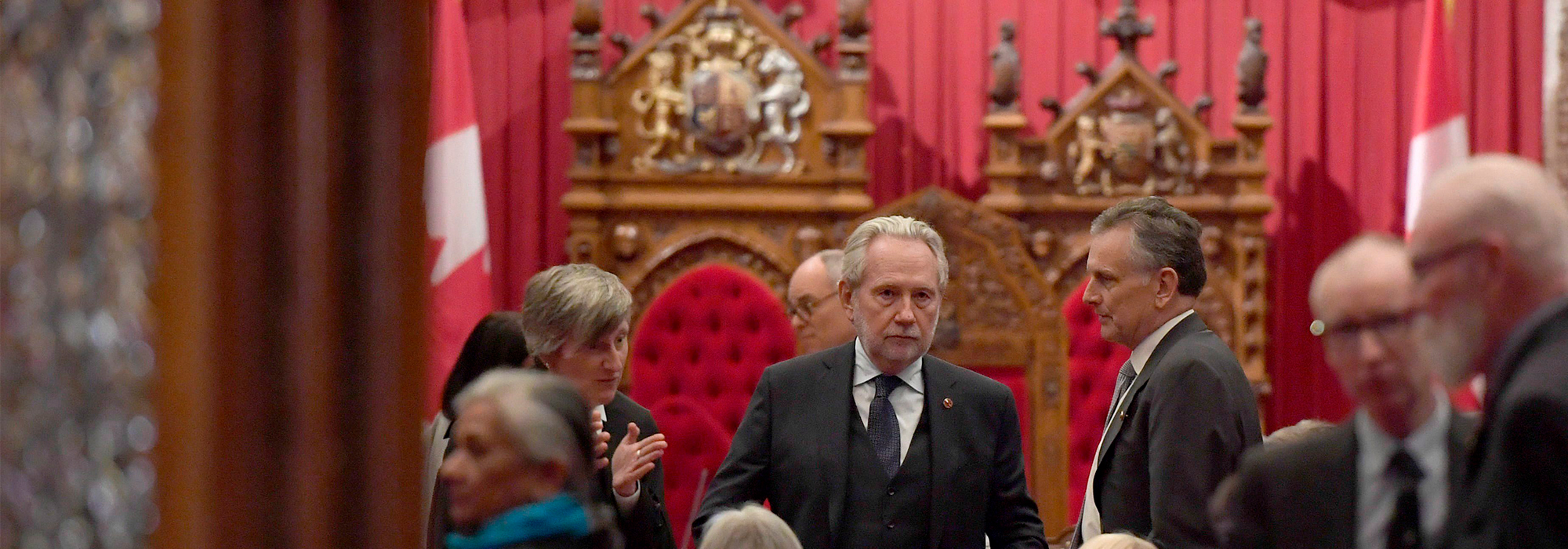
In April, Senator Peter Harder, the Trudeau government’s representative in the Senate, shared the government’s agenda for the upper chamber. His paper aims to advise senators from all parties and groups on how they should conduct themselves when reviewing government legislation.
This is rather ironic since the Prime Minister has, until recently, been conveying a message of independence to his new appointees. In fact, it was suggested by Trudeau when he was opposition leader that perhaps the only modern use for the Senate was as a check against the ever-expanding powers of the executive branch. Now, not only does the Prime Minister want to tell his appointees how to vote, he’s also attempting to tell the Official Opposition how it should play its constitutional role.
We’ve come a long way in a brief period of time on the Prime Minister’s ambitions for Senate “independence” — practically full circle.
I would argue that, as with any organization, there is always room for improvement in how the Senate is performing and, in particular, in searching for ways to increase efficiency, transparency and accountability. However, I know that, for the most part, senators take their job of holding government to account seriously. This is especially the case when it comes to reviewing government legislation.
One of the most recent examples concerns Bill C-49, the Transportation Modernization Act. This legislation is exceedingly complex, and senators heard from multiple stakeholders from across the country as they appeared before committee. Many stakeholders raised serious concerns and, as a result, it was apparent to a majority of senators that the legislation could be improved. Senators listened to the concerns of Canadians and proposed a total of 18 amendments — amendments supported by senators from our Official Opposition caucus but also, importantly, by other senators.
This is a good thing. One of the primary constitutional responsibilities of the Senate is to take a final but close look at government legislation for potential shortcomings and omissions and, in doing so, to listen to Canadians who may not have had their voices fully heard by the House of Commons. In this regard, senators have an obligation to listen to the informed views of Canadians and not simply to follow the political agenda set by the Prime Minister’s Office.
Despite the strong support the amendments made by the Senate to Bill C-49 received from senators, 15 amendments were completely rejected by the Trudeau government. Only two were accepted without changes while three of the amendments were partially supported, though with changes.
After receiving no valid explanation for rejecting the original amendments, senators decided to again insist on just two of the amendments they deemed critical to the fair treatment of Canadians, particularly in Atlantic Canada. In doing so, the upper chamber fulfilled a core function for which it was created: to equitably stand up for regional concerns when faced with a potentially unfair national policy.
When legitimate concerns reflecting many sectors and regions are being voiced, it is our duty as senators to take them seriously. The Senate cannot just be a rubber stamp. It must function as an independent chamber of Parliament when required to do so. It is not our role to ensure government legislation gets passed without amendment. Rather, our role is to be prepared to carefully consider the totality of government proposals and to make amendments if and when that may be necessary.
The Senate is functioning in a similar fashion in relation to Bill C-45, the government’s proposal to legalize marijuana. If, after hearing from Canadians, a majority of senators believe that there are obvious gaps in this legislation, and that amendments are warranted to better protect our youth, to show respect for Indigenous peoples or to better serve and protect our citizens, then it would be entirely appropriate for amendments to be made.
Regardless of which political party is in power, deliberation on government legislation by the Senate is a critical component of policy-making, particularly in a system that is increasingly driven by the executive branch. Such sober second thought is an important contributor to democracy.
I can see only one reason why Prime Minister Trudeau, acting through his Senate representative, now feels the need to publish guidelines on how senators should address legislation. With a federal election on the horizon, Prime Minister Trudeau is walking back his wish for independence in the Senate. Preferring speedy and unamended passage of legislation, he’s hoping for something other than a reasonable check on his powers.
Time will tell whether the Senate of Canada chooses that path or, alternatively, chooses a more independent path that is able to represent the views of Canadians.
Photo: OTTAWA – Sen. Peter Harder, government representative in the Senate, left, speaks with Sen. Larry Smith, leader of the opposition in the Senate, before a vote on Bill C-45, the Cannabis Act, in the Senate chamber on Thursday, March 22, 2018. THE CANADIAN PRESS/Justin Tang
Do you have something to say about the article you just read? Be part of the Policy Options discussion, and send in your own submission. Here is a link on how to do it. | Souhaitez-vous réagir à cet article ? Joignez-vous aux débats d’Options politiques et soumettez-nous votre texte en suivant ces directives.








